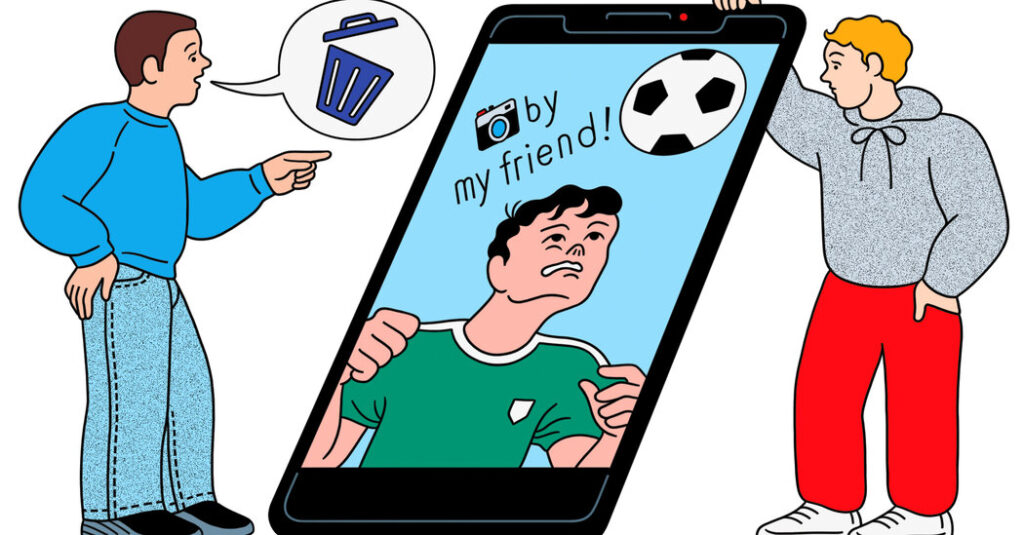The other day, I posted a photo of a soccer player, whom I consider to be an acquaintance — I’m closer to the photographer — to my Instagram story. (I’m in high school, as are all the people I’m discussing.) Shortly after, a friend D.M.’ed me to say that the soccer player is “a racist” who “did blackface and said the N-word.” Even so, I decided not to delete it.
I told my friend that even if I’d known earlier, I wouldn’t have completely cut the soccer player off. I become close only with people I respect, and other things being equal, I have far less respect for racists than for nonracists. But my relationship with the soccer player amounts to chatting in class and occasional texts. I didn’t see a problem with that level of contact even if he had said or done racist things. I also said that what my friend was urging me to do felt like the kind of “cancel culture” that, in my view, makes liberals look bad and offers no one any grace.
My question is: If I claim to be an equality-driven liberal (which I imply on my Instagram), am I obligated to completely disassociate from anyone I know to be racist? And should I have taken down the Instagram story? — Name Withheld
From the Ethicist:
Racism is a moral failing, but it comes in degrees. And the moral failing is coupled with a conceptual one: the human propensity to traffic in essentializing labels. That’s why it’s usually wiser to attach “racist” to actions rather than to people. When racism goes from a kind of act to a kind of person, from what you did to who you are, we risk another kind of essentialism that freezes character, dissolves context and invites dubious inferences. If the guy is “a racist,” then every action gets read through that; if he’s “not a racist,” even ugly behavior can get waved away.
Like you, I favor a bit of grace in a world full of sinners. And cutting off everyone who is morally flawed would leave you with a very small coterie of friends — who might then be tempted by the flaw of moral vanity. (In which case you’d have to get rid of them, too.) I’m not saying there aren’t lines to be drawn: If your classmate sincerely thinks the slave trade or the Holocaust was fine, we’re probably beyond teachable moments. But a private, candid conversation with him could give you a better sense of where he’s coming from, and him a better sense of where you’re coming from.
Yes, blackface trails a long history of degradation, but that doesn’t tell you exactly what one teenager thought he was doing with the bronzer. And an accusation that somebody said the N-word can be hard to evaluate in a world where so much popular music features the version that ends with “a.” What did the word mean to him and what did he intend by using it? Was he treating it as a joke, trying to be an edgelord, baiting someone, quoting mindlessly? Even if we stipulate that what he did was messed up, wouldn’t it be more helpful to have an exchange with him about it, rather than cutting him off without explanation?
As for the Instagram story, you posted before you knew. Leaving it up wasn’t an endorsement of racism; it was a photo of a player taken by a friend. Taking it down, without explanation, wouldn’t have communicated much, except to the person who complained.
You say you’re an equality-minded liberal. The way to live your creed isn’t by curating a spotless feed of spotless minds but by helping people do better. Hew to the norm; judge the person by what he does next; show grace where it stands a chance to help someone grow. That’s the difference between moral vanity and moral work.
Readers Respond
The previous question was from a reader who was debating whether to be honest with her nearly grown children about their father’s true character. She wrote:
I’m the mother of two teenagers: a 19-year-old daughter and a 17-year-old son. I have been separated from their father for almost two decades after a mismatched, troubled relationship in our youth. … Their father, however, still harbors deep resentment toward me and has spent years undermining my efforts to provide structure and stability. … I’ve striven to maintain neutrality: highlighting his parenting positives and modeling ideal co-parent support to shield the kids from our conflicts. … For almost two decades, this man has financially abused me and done everything in his power to undermine my career and my well-being. During this time, I have paid for everything related to the kids, been solely responsible for all extracurricular support, prioritized education and — oh, yeah — also put huge efforts into ensuring that my kids have the best relationship possible with this man. This felt right when they were young, but when does it stop? Am I justified in halting praise once both are legal adults? — Name Withheld
In his response, the Ethicist noted:
The wisdom from child development and family psychology is clear: Children generally fare better when they’re not drawn into parental conflict or asked to reconcile competing narratives about who’s right or wrong. You did well to try to protect them from that, especially when they were younger.
Still, such protection can, over time, distort reality. As children mature, their emotional and cognitive capacity for complexity deepens, and so does their need for truth. The moral balance shifts: Respecting them means being straight with them. So while your restraint has been wise parenting, wisdom also means knowing when the purpose of that restraint has run its course. You can continue to avoid vilifying their father while acknowledging how difficult your dealing with him has been. At some point, shielding them completely from that truth risks undermining their ability to see their family, and their own lives, with clarity.
(Reread the full question and answer here.)
⬥
I worked very hard to shield my kids from my feelings about my ex-husband’s behavior. As they reached their late teenage years, I began sharing more — usually when they were upset about something they had experienced with him. I still tried very hard not to bad-mouth him, but I would share memories of times he had done something similar to me, explain how it made me feel and how I had overcome those bad feelings. Now that my children are 27 and 29, I am happy to say that they have strong relationships with both me and my ex-husband. They are able to understand why he and I were not a good fit, and they are also adept at avoiding some of the emotional traps that I was not as successful at avoiding when we were married. — Melise
⬥
I know someone whose ex-spouse invented false stories to try to poison their child’s mind and heart. This person never spoke ill of his ex or tried to counter these lies, but instead focused on being a good father. He was surprised to discover later that his son, at this point in his 30s, still carried false ideas that were hurting their otherwise very close relationship. They talked it through and the lies were finally refuted, but it became evident that damage had been done by staying silent long past the son’s entry into adulthood. I would advise the letter writer to speak up sooner rather than later. — Nelle
⬥
Like the letter writer, I shielded my children from the reality of the way their father behaved and what he said. I am glad I took the high road. But I believe I went too far in trying to present him as a loving father who made appropriate decisions. As kids get older, they can see for themselves when a parent is selfish, unstable or makes unsuitable parenting decisions. And if the “safe” parent doesn’t seem aware of the problem, it can leave the kids feeling isolated and confused. The letter writer’s children are definitely old enough for her to be clear with them that their father’s choices are not always ones she can support without attacking his character. By doing so, she creates a safe space for them to share their own ideas and brainstorm strategies for responding to their father. — Sharon
⬥
I wonder if the letter writer has been too accommodating to her ex. The pattern she describes of disregard for custodial agreements would have warranted mediation long ago. The picture she paints of her ex is of a selfish, deceitful and manipulative person; these characteristics will not magically go away when the kids are both legal adults. In fact, the ex may gain more influence then, when their mother has less recourse to intervene. Given all this, and that the minor son seems to be facing ill effects from his father’s interference, I would suggest urgency in addressing this dynamic, even before her son turns 18. — Meghan
⬥
I bent over backward to make it as easy as possible for my ex to have a relationship with our kids when they were young. I wanted my kids to have a “loving father” as I had. I now know that it was a mistake. It would have been much better to leave it totally to my ex to decide how much effort he wanted to put into maintaining a relationship. My accommodations set the kids up to have false expectations about how important they were in their father’s life. I think it contributed to confusion and anger in their adolescence and teenage years. — Linda
The post An Acquaintance Might Be a Racist. Do I Need to Drop Him? appeared first on New York Times.




